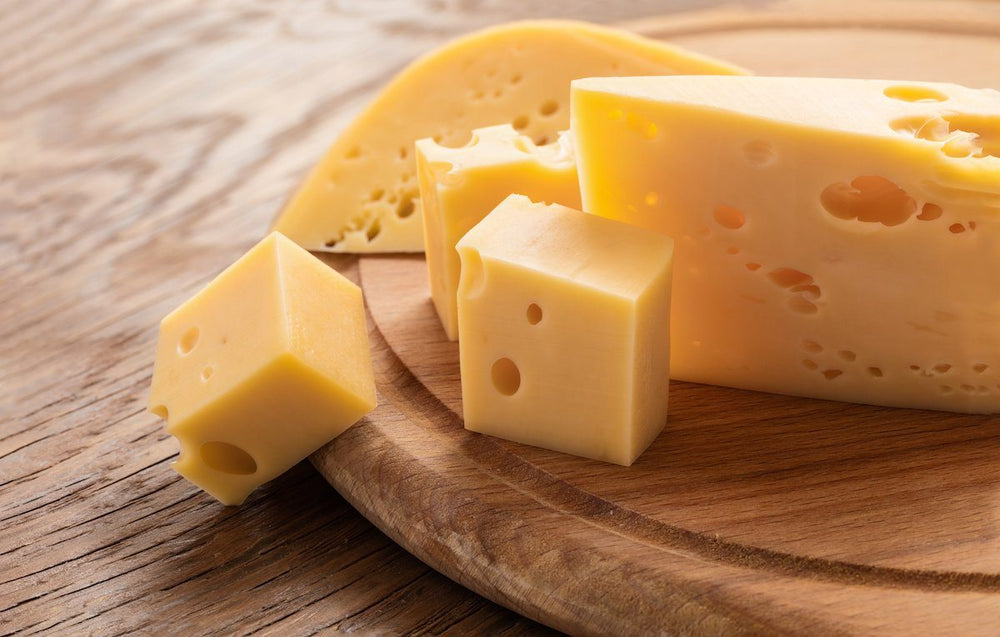If you’re asking, “Can dogs be lactose intolerant?,” you may have already noticed some of the signs of this condition in your dog. Much like people, dogs can be lactose intolerant, and the ones that are will experience digestive discomfort whenever they eat dairy. But, many dogs can eat dairy and feel fine. And some dairy products, like cheese or Himalayan dog chews, can make excellent training aids. Learning to recognize the signs of lactose intolerance in dogs will help you determine if your pup can eat dairy.
Lactose intolerance doesn’t affect all dogs the same way. It occurs on a sliding scale with a range of symptoms. Some lactose intolerant dogs will experience symptoms from even a small amount of dairy, while others will need to eat more dairy products before symptoms emerge.
Learn what causes lactose intolerance in dogs, how to recognize the symptoms, and how to determine if your dog should eat dairy.
What Causes Lactose Intolerance in Dogs?

Now that we know the answer to, “Can dogs be lactose intolerant?,” the next question is “Why?” Why are some dogs lactose intolerant while others have no problem digesting lactose? The answer comes down to food intolerance and digestive enzymes, and some of this relates to breeds and their genetics.
Allergies vs. Intolerances
Food allergies and food intolerances are actually quite rare in dogs. According to veterinary research, only 0.2% of dogs suffer from food allergies, but dairy is one of the most common food allergens for dogs, along with beef, chicken, and wheat.
Dairy allergies and dairy intolerances are, in fact, different things, and intolerances are much more common than true allergies. A true allergy can cause adverse reactions like itchy skin, swelling, shortness of breath, anaphylactic shock, and even death — but this is extremely rare.
If your dog ever appears short of breath or you notice swelling around their nose, mouth, or throat, take your dog to a qualified doctor of veterinary medicine (DVM) immediately. Your dog may be having a potentially deadly allergic reaction.
A food intolerance is not life-threatening and will primarily present as digestive issues.
Lactose and Lactase
When a dog has a dairy intolerance, it’s typically because the dog's digestive system is struggling to break down the lactose content in dairy products, which is why we call it “lactose intolerance.”
Lactose is a type of sugar that occurs naturally in milk products. The body relies on a digestive enzyme called lactase to break down the lactose in dairy. The amount of lactase in a dog's body will determine the amount of lactose they can comfortably digest.
Puppies have higher levels of lactase because they need it to digest their mother's milk. After weaning, puppies' lactase levels may begin to decrease. Some adult dogs' bodies don't produce enough lactase to digest large amounts of dairy — but, this isn't true for all adult dogs.
Genetic sequencing revealed that dogs of European descent retain their ability to produce lactase into adulthood more than other dogs. Studies in humans have found the same thing — people of European ancestry retain their ability to produce lactase into adulthood more than other populations.
The theory is that both European humans and European dogs started incorporating dairy as part of their diets at around the same time. Dairy was widely available in this region when other foods weren't, so being able to digest dairy was necessary for survival. Because humans and dogs have evolved together for so long, they both evolved the ability to digest dairy in this region.
This European connection is important for American dog owners because 12 out of 15 of the most popular dog breeds in the U.S. are of European descent. Of the three that aren't (Labrador retrievers, Australian shepherds, and Siberian huskies), two of them (Labs and Aussies) were originally bred from a mixture of European breeds.
So, there are likely to be a lot of dogs in the U.S. who can comfortably digest lactose. Those who can't may experience a variety of gastrointestinal symptoms after eating dairy.
Symptoms of Lactose Intolerance in Dogs

The symptoms of lactose intolerance can range from mild to severe. They don't always come on immediately after eating dairy — they can emerge up to 48 hours after ingestion.
Watch for these signs of lactose intolerance:
- Flatulence
- Bloating
- Abdominal pain
- Loose stool
- Diarrhoea
While these are the most common symptoms of lactose intolerance, they are also common symptoms of a variety of other digestive problems.
If you notice any of these symptoms, use the technique we outline in the next section to determine if dairy is the true cause of your dog's GI issues.
How to Determine If Your Dog Is Lactose Intolerant

If your dog is showing signs of digestive distress, dairy may be to blame — or it may not. Your dog could be suffering from a different food allergy. They could have a sensitive stomach. They could be stressed about a recent change and need help from a natural calming aid. Or they could have a virus or parasite.
If your dog experiences diarrhoea that doesn't subside within two days, talk to your vet. Your vet can help you rule out a more serious underlying condition, like a parasite.
Once your vet has ruled out more serious conditions, you can test your dog for lactose intolerance. Start by removing dairy products from your dog's diet for 30 days. Check the ingredient decks on your dog food and treats to make sure your pup isn't digesting any dairy that you don't know about.
Pay attention to your dog's symptoms during the 30-day removal period. If their symptoms don't clear up, dairy likely isn't the problem. You can move on to testing for other dog food allergies. Or you can try adding probiotics or pumpkin into your dog's diet to support healthy digestion.
If your dog's symptoms do start to clear up, then it's time to officially determine if dairy is the cause. There's still a chance that it was short-term stress or a virus that caused the initial stomach upset. To rule out a coincidence, you'll have to put dairy to the test.
Give your dog one small serving of dairy each day for three days. You might try giving them a small bowl of cow's milk or goat's milk on day one, followed by a scoop of cottage cheese on day two, and some doggy ice cream on day three.
Next, you'll remove dairy from your dog's diet once more. Don't feed your dog any dairy for two days. Wait to see if symptoms reemerge. If they do, then you've probably found the cause of your dog's digestive issues. If they don't, then your dog can most likely enjoy the occasional dairy snack without digestive discomfort.
So, Can Dogs Be Lactose Intolerant?

Yes, dogs can be lactose intolerant just like people. However, although dairy is among the most common food allergens for dogs, food allergies are still uncommon, and many dogs drink milk without issue.
To determine whether you have a lactose intolerant dog or not, use the instructions above to conduct a food intolerance test. Watch for gastrointestinal issues over the course of your test. If none emerge, then your dog can safely digest this “human food.” Most dogs enjoy full-fat dairy, but if your dog has pancreatitis, opt for fat-free dairy instead. Try giving your pup small bites of cheese as a training treat, make them a pup-friendly pumpkin spice latte, or offer them a long-lasting, all-natural yak chew — made from cow's milk, yak's milk, lime juice, and salt — to encourage independent play.
If your dog does experience digestive discomfort when they eat dairy, try offering them a dairy alternative like almond milk, soy milk, or coconut milk. (Just make sure the plant-based milk doesn't contain artificial flavors or sweeteners, like xylitol, which can be toxic to dogs.) Mix in some probiotics for dogs to make a dairy-free yogurt alternative and promote healthy digestion. Or try this healthy doggy ice cream recipe with pumpkin and coconut milk. Either way, your dog likely won't miss the dairy.
For more information on your dog's health and wellness, check out the Native Pet blog.

